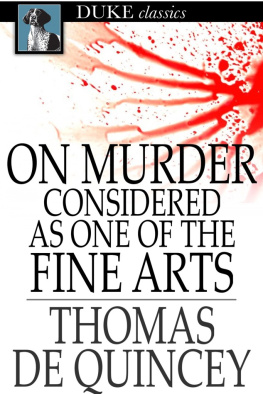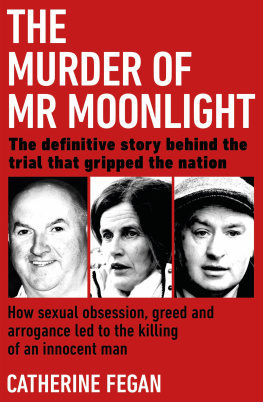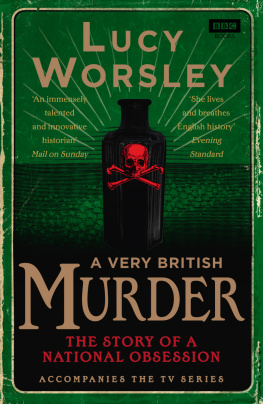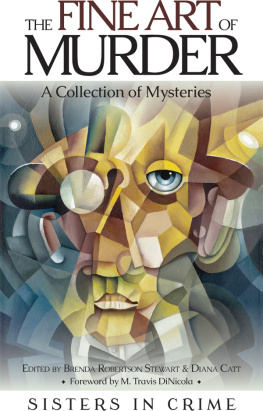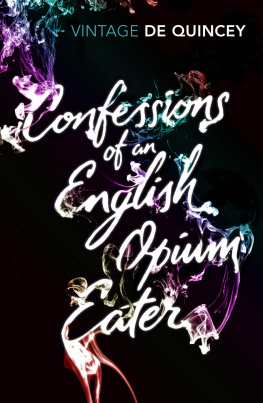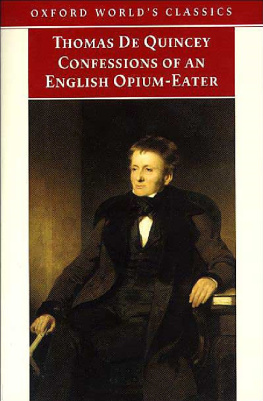ON MURDER CONSIDERED AS ONE OF THE FINE ARTS
AND OTHER WRITINGS
* * *
THOMAS DE QUINCEY
*
On Murder Considered as One of the Fine Arts
And Other Writings
First published in 1827
ISBN 978-1-62012-924-1
Duke Classics
2012 Duke Classics and its licensors. All rights reserved.
While every effort has been used to ensure the accuracy and reliability of the information contained in this edition, Duke Classics does not assume liability or responsibility for any errors or omissions in this book. Duke Classics does not accept responsibility for loss suffered as a result of reliance upon the accuracy or currency of information contained in this book.
Contents
*
Onthe Knocking at the Gate,in Macbeth
*
From my boyish days I had always felt a great perplexity on one point inMacbeth. It was this: the knocking at the gate, which succeeds to themurder of Duncan, produced to my feelings an effect for which I never couldaccount. The effect was, that it reflected back upon the murder a peculiarawfulness and a depth of solemnity; yet, however obstinately I endeavoredwith my understanding to comprehend this, for many years I never could seewhy it should produce such an effect.
Here I pause for one moment, to exhort the reader never to pay anyattention to his understanding when it stands in opposition to anyother faculty of his mind. The mere understanding, however useful andindispensable, is the meanest faculty in the human mind, and the most tobe distrusted; and yet the great majority of people trust to nothing else;which may do for ordinary life, but not for philosophical purposes. Of thisout of ten thousand instances that I might produce, I will cite one. Ask ofany person whatsoever, who is not previously prepared for the demand bya knowledge of perspective, to draw in the rudest way the commonestappearance which depends upon the laws of that science; as for instance, torepresent the effect of two walls standing at right angles to each other,or the appearance of the houses on each side of a street, as seen by aperson looking down the street from one extremity. Now in all cases, unlessthe person has happened to observe in pictures how it is that artistsproduce these effects, he will be utterly unable to make the smallestapproximation to it. Yet why? For he has actually seen the effect every dayof his life. The reason isthat he allows his understanding to overrulehis eyes. His understanding, which includes no intuitive knowledge of thelaws of vision, can furnish him with no reason why a line which is knownand can be proved to be a horizontal line, should not appear a horizontalline; a line that made any angle with the perpendicular less than a rightangle, would seem to him to indicate that his houses were all tumbling downtogether. Accordingly he makes the line of his houses a horizontal line,and fails of course to produce the effect demanded. Here then is oneinstance out of many, in which not only the understanding is allowed tooverrule the eyes, but where the understanding is positively allowed toobliterate the eyes as it were, for not only does the man believe theevidence of his understanding in opposition to that of his eyes, but,(what is monstrous!) the idiot is not aware that his eyes ever gave suchevidence. He does not know that he has seen (and therefore quoad hisconsciousness has not seen) that which he has seen every day of hislife. But to return from this digression, my understanding could furnish noreason why the knocking at the gate in Macbeth should produce any effect,direct or reflected. In fact, my understanding said positively that itcould not produce any effect. But I knew better; I felt that it did; andI waited and clung to the problem until further knowledge should enable meto solve it. At length, in 1812, Mr. Williams made his debut on the stageof Ratcliffe Highway, and executed those unparalleled murders which haveprocured for him such a brilliant and undying reputation. On which murders,by the way, I must observe, that in one respect they have had an illeffect, by making the connoisseur in murder very fastidious in his taste,and dissatisfied by anything that has been since done in that line. Allother murders look pale by the deep crimson of his; and, as an amateur oncesaid to me in a querulous tone, "There has been absolutely nothing doingsince his time, or nothing that's worth speaking of." But this is wrong;for it is unreasonable to expect all men to be great artists, and born withthe genius of Mr. Williams. Now it will be remembered that in the first ofthese murders, (that of the Marrs,) the same incident (of a knocking at thedoor soon after the work of extermination was complete) did actually occur,which the genius of Shakspeare has invented; and all good judges, andthe most eminent dilettanti, acknowledged the felicity of Shakspeare'ssuggestion as soon as it was actually realized. Here, then, was a freshproof that I was right in relying on my own feeling in opposition to myunderstanding; and I again set myself to study the problem; at lengthI solved it to my own satisfaction; and my solution is this. Murder inordinary cases, where the sympathy is wholly directed to the case of themurdered person, is an incident of coarse and vulgar horror; and for thisreason, that it flings the interest exclusively upon the natural butignoble instinct by which we cleave to life; an instinct, which, as beingindispensable to the primal law of self-preservation, is the same in kind,(though different in degree,) amongst all living creatures; this instincttherefore, because it annihilates all distinctions, and degrades thegreatest of men to the level of "the poor beetle that we tread on,"exhibits human nature in its most abject and humiliating attitude. Such anattitude would little suit the purposes of the poet. What then must hedo? He must throw the interest on the murderer. Our sympathy must be withhim; (of course I mean a sympathy of comprehension, a sympathy by whichwe enter into his feelings, and are made to understand them,not asympathy of pity or approbation.) In the murdered person all strife ofthought, all flux and reflux of passion and of purpose, are crushed by oneoverwhelming panic; the fear of instant death smites him "with its petrificmace." But in the murderer, such a murderer as a poet will condescend to,there must be raging some great storm of passion,jealousy, ambition,vengeance, hatred,which will create a hell within him; and into this hellwe are to look.
In Macbeth, for the sake of gratifying his own enormous and teeming facultyof creation, Shakspeare has introduced two murderers: and, as usual in hishands, they are remarkably discriminated: but, though in Macbeth the strifeof mind is greater than in his wife, the tiger spirit not so awake, and hisfeelings caught chiefly by contagion from her,yet, as both were finallyinvolved in the guilt of murder, the murderous mind of necessity is finallyto be presumed in both. This was to be expressed; and on its own account,as well as to make it a more proportionable antagonist to the unoffendingnature of their victim, "the gracious Duncan," and adequately to expound"the deep damnation of his taking off," this was to be expressed withpeculiar energy. We were to be made to feel that the human nature, i.e.,the divine nature of love and mercy, spread through the hearts of allcreatures, and seldom utterly withdrawn from man,was gone, vanished,extinct; and that the fiendish nature had taken its place. And, as thiseffect is marvellously accomplished in the

